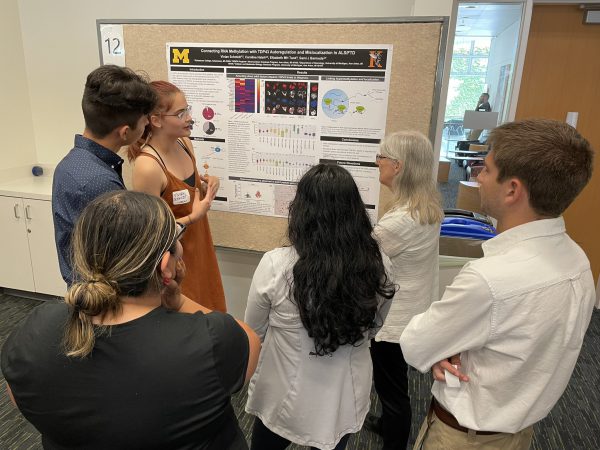When progress is made in the fight against neurological afflictions such as ALS, Alzheimer’s disease and Parkinson’s disease, students such as Vivian Schmidt ’25 often are on the frontlines of research.
Schmidt, a biology and psychology double major with a concentration in neuroscience at Kalamazoo College, is having a cutting-edge experience this summer at the University of Michigan. She is working for 10 weeks in the institution’s Summer Intensive Research Experience in Neuroscience (SIREN) program, a highly desirable opportunity that accepts only about 20 applicants each year out of hundreds. As a bonus, she’s directly working with Michigan faculty such as K alumna Elizabeth Tank ’03, an assistant research scientist in neurology.
The initiative is funded by the National Science Foundation’s Research Experiences for Undergraduates (REU) program, which also provides Schmidt with a stipend and on-campus housing.
“It’s surreal to think that everything I did in high school and my first two years at K led to this opportunity,” Schmidt said. “I’ve met a lot of incredibly witty, smart and established professionals in their field, who have done phenomenal things. It definitely has solidified my desire to come here for graduate school, as well. It’s been amazing to get to know the faculty members and the culture of the program here.”
SIREN research this summer involves a range of topics within neuroscience. Schmidt’s specific project is investigating what goes wrong with a protein that has ties to ALS and dementia to understand the underlying causes of the conditions. The hope is that the science will one day reveal therapeutic options that assist treatment.
“Even the failures are exciting now because I’ve realized they tell me this one thing didn’t work,” Schmidt said. “I ask, ‘Why didn’t this work?’ as opposed to getting down on myself. The daily successes have involved my mental attitude and keeping up my enthusiasm, especially in such a long program, and ultimately, the overall goal is presenting my research.”
In a way, such an opportunity for Schmidt could have been predicted. She’s been interested in studying how people think since high school, and her biology and chemistry classes helped her develop a passion for biological-based research rather than clinical approaches to psychology.
“I wanted to be the one getting my hands dirty in the lab,” she said. “I wanted to be the one who tries to figure out why something failed and then try it again. I’ve known since my first year in high school that I wanted a Ph.D. in neuroscience, and it’s something I’ve been gunning for since.”
Schmidt has received a lot of encouragement from K faculty and staff such as Professor of Biology Blaine Moore, Director of Biology Labs Anne Engh and Assistant Professor of Chemistry Daniela Arias-Rotondo. Moore, however, was the one Schmidt conversed with even before she arrived at K. He, Arias-Rotondo, and Engh have written countless letters of recommendation on her behalf.


“I did my apprenticeship with Dr. Moore in the spring after he was phenomenally supportive throughout my first year, so I made him my official academic advisor,” she said. “He’s been great at guiding me with which classes to take and pushing me to do what he knows I’m capable of. I might not 100% believe in myself all the time, but I know he believes in me. Kalamazoo College is better for him being there.”
Study abroad opportunities and a wide range of subjects within her reach were big reasons why she chose K.
“The fact that I could do a double major and still have room to take classes that had absolutely nothing to do with neuroscience was a huge draw,” she said. “My first year I took jazz explorations and Hindu traditions and they were some of my favorites. I don’t think I would have been able to do that at another school.”
Thanks to a well-rounded K-Plan, Schmidt also plays on the women’s lacrosse team, participates in an astrophotography- and astronomy-focused student organization she co-founded called Konstellation, and plans programming for first-generation students like herself through the Intercultural Center. But research will always be her focus at K, throughout graduate school, and hopefully, in her professional life.
“I’ve been tossing around a few ideas, because with a Ph.D., I could go an industrial route or go into teaching, or I could work somewhere like the Van Andel Institute, where I could just be a research scientist,” she said. “I’ve always had a bit of an interest in teaching, mentorship and explaining things to people, too. At this moment, I’m thinking I would love to be a professor at an institution where I can teach and do research. That would be ideal, but no matter what, as long as research is involved, I’m going to be happy.”
